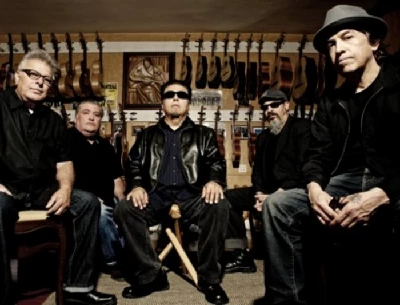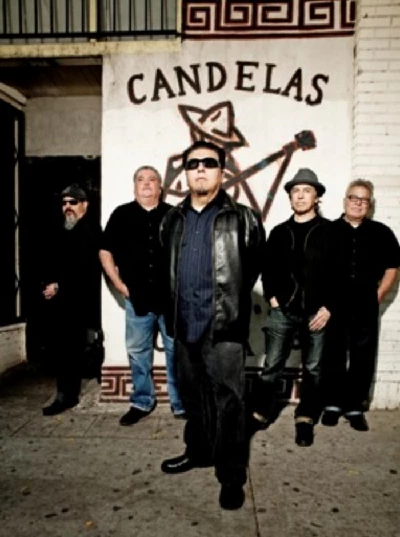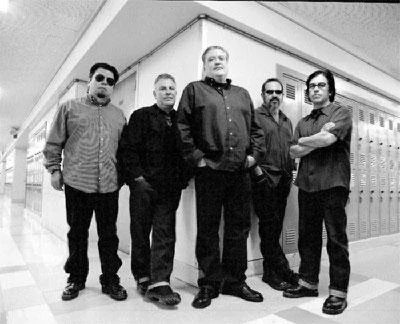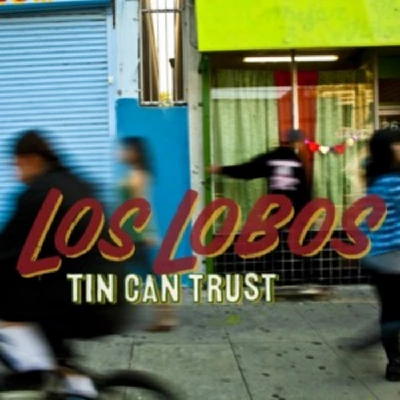published: 25 /
6 /
2010
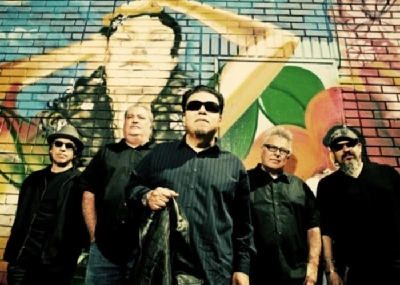
Lisa Torem talks to Steve Berlin, the horn player and percussionist with Los Lobos, about his group's unique merging of the traditional music of Latin America along with rock, blues and acoustic folk, and their forthcoming new album, 'Tin Can Trust'
Article
With a discography of nearly 20 albums, three Grammy awards, major contributions to the soundtracks of ‘The Mambo King’ and ‘La Bamba’ and a passion for exploring the traditional music of Latin America along with rock, blues and acoustic folk, Los Lobos could have rested on their LA laurels, but that would be totally out of character.
Instead, the band has continued international touring, composing original music and arranging traditional ones, too, for a new record, ‘Tin Can Trust’ released on their fourth record label.
Days before my interview with Los Lobos horn player, percussionist, and engineer Steve Berlin, my friend Maria invited me over to listen to her favorite Los Lobos records. She told me that she had been following them since ‘La Bamba’ and that she and her spouse Gene had seen them in Fort Pierce, Florida playing to a mid-sized, but loyal following.
Recalling that they had also seen them in Highland Park’s Ravinia in 1998 and at Chicago’s Riviera Theater, playing to a mostly middle-aged crowd, she wondered if the newest generation was familiar with their work.
But, when we listened to the ethereal ‘Kiko and the Lavender Moon,’ she was reminded that her 21 year old daughter had danced to this tune as a little girl, and for all actual purposes, had grown up with it. .
My suspicions that Los Lobos attracted an all ages crowd was confirmed further when a 14 ½ year old named La’Shenna told me about her elementary school dance performance. She had used ‘La Bamba’ as her backing track.
La’Shenna not only loved the frenzied beat, but also confessed that she preferred the Spanish lyrics over English ones. It made the song more mysterious and left her able to concentrate more fully on her steps.
More than 25 years ago, the band’s first major label release, ‘How Will The Wolf Survive’ produced by T Bone Burnett, cemented their reputation as a band that rocked hard, but could still tone it down for acoustic folk and reflective Corridos.
Keyboardist and horn player Steve Berlin joined the band in 1984 (the other members had joined up in the late 70s) after co-producing with T-Bone Burnett their 1983 EP ‘And A Time to Dance’. Berlin sounded excited, while talking on the phone, about producing the band’s newest release, ‘Tin Can Trust.’ In measured tones, he explained the nuance and serendipity required to make the new album shine, and how so much of what Los Lobos does is neither calculated nor predetermined.
On the liner notes to the band’s debut, ‘Just Another Band from East LA’ (1978) producer and LA journalist Luis Torres had printed this band quote:
“We were the living embodiment of the distillation of two worlds – two cultures.”
It seems as if that statement is as descriptive of the band’s current state of mind as when it was first uttered. Few bands have remained as close and as committed to a collective artistic vision as Los Lobos has.
Berlin explains how Los Lobos has become a second family, why they took a stand on Arizona’s recent immigration Bill SB1070, how they have kept generating original material despite grueling touring schedules and how they have been greatly influenced by their touring mates.
PB: Hi Steve. I know you’ve worked with T Bone Burnett previously producing albums with Los Lobos. And, now, besides playing horns and percussion in the band, you’ve just finished producing ‘Tin Can Trust.’ How has the production process differed from your other recordings?
SB: I would say that the main difference production wise is that really, for the first time in about ten years, we were in a recording studio big enough for all of us to play together. In the intervening ten years we recorded in Cesar’s house (Cesar Rosas, guitarist and singer-Ed)– which was great – I mean it worked. I have nothing but good feelings about the records that we did there, but, it was a garage that we turned into a studio, so it was a smaller space. The way it was configured it was almost impossible for all of us to play there all together at the same time.
It was one size and there were never enough working head phones and working microphones or working something or other to keep all six of us playing together.
The main difference is, for most of the record, not all of it; it’s the sound of us all playing live as we do when we’re on stage.
Also, the studio that we recorded in was a very funky, bizarre run-down sort of place. It definitely had and has a sonic imprint which was very evident, to me on every track.
You could hear the sound of this wonderful warm room sort of percolating in the background. It gives the record a sort of three dimensional quality that our other records don’t have, but this was sort of built in. It was an unavoidable artifact of the room that we recorded in.
PB: ‘Tin Can Trust’ has a real mix; three songs in Spanish, including a Cumbia, ‘Yo Canto,’ a Jerry Garcia cover, ‘West LA Fadeaway,’ driving rock as in ‘Burn it Down’ and blues. I know you’ve worked with John Lee Hooker before. Were you looking to capture that kind of blues influence?
SB: Oh, yeah. Really, it’s just part of our DNA that comes with the territory. That’s pretty much at the heart of what we do. We record. To a certain extent, also, it’s when we started this record we had kind of been on the road non stop for the better part of a year. So, there really wasn’t much material written and ready to go. Everyone was sort of exhausted and let’s just get together and cook something up.
The last time that happened when we were sort of in the same state of mind was ‘Colossal Head’(1996 album-Ed) And, usually what happens when we’re like that is we go back to the roots. I guess you could say the primordial instinct of the band; pretty much those things you identified; the blues, the Cumbias, Nortenos.
We start there and build out, I guess you could say. So, that’s where a lot of the bluesiness of the record comes from, I would say.
PB: One cut, ’27 Spanishes arriving from the Sea’ seems to have a unique back story.
SB: It’s funny. It’s an idea that Louie (Perez, percussionist and guitarist-Ed )has had in his head for a long time. The short version of the Spanish Conquest of Latin America reduced to a poor man’s song. The lyrics are amazing and he really does, in a funny way, tell the story of the Spanish Conquerors in a sort of ironic, tongue in cheek way, and, musically, that’s all Dave (David Hidalgo, singer and multi-instrumentalist-Ed). That’s Dave on drums, Dave on bass, guitars. I don’t believe anybody else played on that one. That’s like Dave’s demo, which he does at home, sort of an archaic recording rig with him singing on top.
PB: “If I could make stone into gold I would,” is a line from ‘Jupiter of the Moon.’ This lyric has a visceral feel, but I couldn’t categorize the music.
SB: Oh, God. I’ve never tried to figure out where these things come from. We find a sound and we ride it, more or less, into the sunset. To me, it sounds like 60s jazz, sort of. There are a couple of songs on ‘Impulse’ that sound vaguely like that song. That’s part of it, at least to me.
But, really a lot of it is the sound of that room I was telling you about; a sound where you could really feel the room breathing along with the track. At one point, you could actually hear Dave was playing the piano and somebody walked into the room so you hear the sound of a door creaking open (Laughs). There’s a lot of “cinema verite” in that song.
PB: ‘The Town and the City’ seemed to centre more around immigration stories. Is that theme going to surface again?
SB: It was funny. That record didn’t start that way. It actually started in a different place, but as it came together we were struck by how there seemed to be an underlying theme. Whenever we start a record we don’t rehearse, we don’t plan. We don’t even really talk about it. We just show up and go, and the song and the albums definitely seem to take on a will of their own.
We sort of follow our proverbial muse and, on that one, as we went about halfway through it, we would try different ideas but everything seemed to come back to the same colour, if you will, and we realized there was a theme and that theme was immigration.
So we said, “Okay” (Laughs). I guess we’re doing a concept record. It really didn’t start out that way. It just sort of fell into our consciousness.
PB: Does the new record label deal satisfy your artistic impulses?
SB: With any record deal we do we make it clear (laughs) that we’re not going to listen to what anybody has to say. We kind of do what we do the way we do it and I would say it served us well for this many years.
Shout Factory, our new label, are great. They’re a small record company and we actually signed the deal about a year ago, right now, June 2009.And, it took us nine months, I don’t know, eight months, nine months, to really get the record going.
They were very, very patient with us, which is very kind indeed.
Most of the time when a small company writes a check, especially what they wrote, it’s kind of difficult to balance the account if the record’s not out and people aren’t making any money. They were very kind to us and very patient with us, in the process.
PB: You were not one of the original band members and didn’t grow up in the same east LA neighborhood. You were raised in Philadelphia. At what point did you really feel part of the band?
SB: You know, almost instantaneously. They were always very welcoming and the cultural differences were never a big deal because we shared a lot from the beginning musically. Frankly, all of our families, except for Cesar, whose family is first generation American, are second generation Americans, so our parents were immigrants, so that I think, to a certain extent, is why we get along. I mean, the stories were really not that different.
PB: They’re also not that different from the turn of the 20th century immigration stories.
SB: Exactly. They were all fleeing something. I think that made us all into very similar people, although, I’m not of Latin descent.
PB: It’s interesting that the band has stayed together for so long.
SB: We’re all kind of long-haul guys. You don’t see any serial marries or divorcers. We’re all in like 25 years plus relationships. It’s just kind of the way we are, I guess.
You’d have a hard time proving otherwise. To that end, there is something that happens when we’re all together. Greater than…what’s that expression? I always screw that expression up. The sum is greater than – whatever it is…
PB: The sum is greater than all of its parts?
SB: If you subtract any one of us it’s not quite the same, but when you put us all together, something really cool happens, not unlike the Grateful Dead. It’s kind of like the Allman Brothers who have been together forever. Although, obviously with some membership changes. I guess we’re one of the very few who have managed to stay together without anybody falling off.
PB: The band toured initially with PIL, then Bob Dylan and the Grateful Dead’s Jerry Garcia. There has been such a range of touring acts. When you travel together, do you have an impact on each other’s set lists?
SB: Again, those things are part of our musical DNA. They’re just there. That’s what we’re made of . We’re those things that you’ve just mentioned, and a few other things as well.
Whenever we do anything, it’s just like, that’s where we are coming from. But, it’s never actually spoken of or discussed. We should do this or do that. It’s really…we’re not conscious of those things until somebody points them out. We’re just making music that makes us happy really.
PB: Jerry Garcia recorded a version of Los Lobos’ ‘Evangeline’ before he died. So has there been a lot of trading back and forth with these covers?
SB: We’re fans and, obviously, he was a fan. The “Dead Connection” for us is probably a little more visceral because we share a lot. There’s a lot of dead heads that are Los Lobos fans and they make their presence known.
They’re an identifiable group at our shows. I guess, to whatever small extent, we like to make them happy because they make us happy.
That’s why we did ‘West LA’ and we’ve written with Robert Hunter. We’ve done ‘Bertha’ for a tribute record to the Dead.
Dave’s worked with Dylan, The Dead, and Jerry, in particular, and has always held a special place for them.
We’re reminded of them and we see their influence very, very often, especially when we play the west coast; California, San Francisco. It’s like they never went away. Their presence is very prominent and their fans are very loud and identifiable and loyal. They’re very loyal. We like them to like us, so we try to make them happy.
PB: How do bands acquire the same fans?
SB: It’s sort of a shared connection. Jerry said often that we were his favourite band. So, their fans knew that Jerry liked us and the Dead are the forefathers of so much of what is happening now, Phish and the whole jam band scene. It’s amazing what that band started; what is still so culturally relevant and powerful and still so emulated to such an enormous degree.
PB: Their early influences were jug band and roots music, too.
SB: The real salient difference is there was really a little bit more country in the Dead approach and blue grass; stuff that we like, but you’ll never ever catch us trying to play. Everything else, blues, and a little bit of country, you could say, certainly soul music. That’s a big part of both bands identities, I would say.
PB: How’s the current touring going?
SB: (Laughs). Endless. It’s what we do. That’s my day job. It’s all I ever wanted from life, really, was to play music for a living, so, this is exactly what I bargained for. It’s great. It keeps everybody happy, our families happy. Although, they miss us and we miss them. But that’s the trade-off. We get to do what we want to do and do it the way we want to do it. That’s really the best part.
We’ve never compromised or had anybody tell us we had to do anything in a certain way. Every record, every tour, everything has been how we wanted it to be. With that comes the responsibility and we have to stand behind it. The touring is part of it. Wherever we plan to go, we go.
PB: Some of the traditional repertoire like ‘Sabor A Mi’ are really gorgeous ballads. Do people appreciate songs like that?
SB: They definitely appreciate it. There are nights where that song is (laughs) is probably the most popular song we’ve played. It really is so dependent on the crowd and the vibe, the room. I will say that it’s very, very hard to write one like that. That’s a classic, classic song. I think we’re content with covering them rather than trying to write them. If we did , then we’d probably just do our cover version of ‘Sabor A Mi.’
I don’t know if you’ve ever seen one of our acoustic shows, but there’s a section where we do two or three songs like that.
PB: Who is responsible for the current songwriting in the band? Is it collaborative?
SB: At this point, really, Dave and Louie write as a team. Cesar actually writes by himself or in collaboration with other people like Robert Hunter and I think we’ve pretty clearly identified our voice. I know that I’m not a songwriter. I think Conrad (Lozano, bassist-Ed) knows he’s not a songwriter.
It’s a very special gift that songwriters have that some people have and some people don’t. but, I think that all of us contribute greatly to the sound and certainly the production of the record. That’s where everybody really pitches in and creates this noise that we make.
PB: Oscar Hijuelos, author of ‘The Mambo Kings Sing Songs of Love’ has just written a companion novel based on the song, ‘Beautiful Maria of My Soul’ from the movie, ‘Mambo Kings’ based on this novel. Los Lobos contributed the English version of this recording for that movie soundtrack, but you have also recorded the song in Spanish, ‘Bella Maria De Mi Alma.’ Who made the decision to have the band record the song in English and were you comfortable with that decision?
SB: That was the director’s decision.
PB: Did the band feel that something would be lost in translation?
SB: No, that was a very positive experience. We were happy to be involved. I think we were extremely happy with everything that went down with it. The trouble is, much like with many of our songs, we learned it well enough to play it once, and people keep requesting it. I would have absolutely no idea how to play that song right now.
PB: It’s extremely intricate.
SB: It really is very intricate. It’s one of those things that we do in the moment. We learn it and it instantly goes away if we don’t keep playing it. We get requests for that song all the time. It would be quite difficult to play, which is unfortunate because I know people would love to hear it. It just didn’t stick in our brain.
PB: Did Los Lobos have any say in the orchestration?
SB: No, that was written. We had nothing to do with the writing of that song. It was actually the director. It’s kind of interesting. It was his first movie and I think he was an art dealer or something. He decided he was going to be a movie director.
That generally was a recipe for a musical disaster, but in this case, he came up with the goods. I think it’s a beautiful, beautiful song, very intricate, great melody, great chords. Who knew? But, it was a chart that they handed to us. I think we took a few liberties with the sound and the arrangement. We had nothing to do with the writing of it.
PB: But, that version was the same one played in the movie.
SB: You know, I never saw that movie, I’m embarrassed to say. But, I believe it was the end credit. Just one more movie I didn’t see. I’m always ten years behind in my movie –
PB: You’ve been a little busy.
SB: I guess so.
PB: I guess so.
SB: I drag them around. I put them all on my computer. I just don’t have time to watch them.
PB: I believe it was nominated for “Best Song written specifically for a motion picture or for television.”
SB I totally forgot it was nominated to be honest with you.
PB: If that novel becomes a film, would you be interested in working on the soundtrack?
SB: Yeah. That would be great.
PB: Your 1992 album ‘Kiko and the Lavender Moon’ was considered experimental. How did the band come up with that arrangement?
SB: It kind of is as written. That’s the way Dave wrote the music. He just sort of had this strange idea in his head and we really didn’t do a lot to it other than play it when he first brought it in. Then, Louie wrote the lyrics and it sort of became this very iconic thing.
That whole record was pretty much the sound of us playing and keeping the first take of everything so it has the sound of a dream like and uncertain quality which I think enhances the dreaminess of it and I think I have to give enormous credit to Mitchell Froom and Tchad Blake who were the sonic architects of that song.
That was the first time we worked with them and, all of us, the band and those two, in this very experimental state of mind, so there’s a lot of processing going on and a lot of bizarre electronic manipulation and, at that moment, that was where we wanted to go with it. There was a lot of crazy (Laughs), wild, sonic spelunking, as they say. It was like exploring a cave with a flashlight.
PB: You’ve recorded albums completely in Spanish, in 1988, ‘La Pistola Y El Corazon.’ Your recording in the late 80s of ‘La Bamba’ was one of the first number one hits sung in
Spanish. There are more than 25 Spanish speaking countries and this is the second language in America. Why aren’t more songs, which are recorded in Spanish, number one hits and how strongly has Los Lobos been influenced by Norteno and Tejano music?
SB: The whole world of hits has become a very arcane, closed culture. You sort of have to play a different game, than the one we’re playing. “I don’t know” would be the short answer. I don’t know what constitutes a hit. You sort of have to pay to play for the most part. I would say; as far as our influences, clearly, we do every night on stage, at least a little bit of Norteno music. The Tejano is sort of a modern movement that we’re fans of, but, not a lot of it fits what we do.
It’s kind of a little bit to the right of what we like but that’s not to disparage the music or the musicians. We’ve always had this sort of Norteno alter-ego that we like to take off and show off, clearly on the new record, ‘Tin Can Trust’ that we have, ‘Mujer Ingrata’ is a classic Norteno. So, that’s part of our DNA, I guess, where as Tejano, and with so many of the other modern influences, I guess, the styles which have come in the last ten or twenty years are just not part of our DNA.
PB: Los Lobos recently cancelled a concert in Arizona. Did the band reach consensus immediately on this?
SB: We wrestled with it for a while for a couple of reasons. Number one, the concert was actually on Native Land. It was an Indian casino and it was a tribe that we had been close to; friends of ours. And, also, there was an organization in Arizona which was fighting the boycott from within.
So, for a little while, at least, we were entertaining the idea of turning it into a benefit for that group that’s fighting the boycott from Arizona. But, the more we discussed it and thought about it, I think we realized, as musicians, that it’s hard for us to amplify our voice, especially when it’s something obviously this ridiculous and unfair, and out of line. So, we, at the end of the day, weighed all our options, and we said we just have to boycott it and pull out.
I know we disappointed our friends down there, but the complexity of going down there and playing and making it a benefit would have been lost. You know what I mean?
It’s like one of those stories, I think you know what I mean, if you can’t put it into a five word sentence then people probably are not going to pay attention.
I think had we done it, it would have been “Los Lobos breaks boycott.”
PB: Have you received any fan reactions?
SB: I have to say there’s been some that are very positive and some very very, very little negative. Some people were very upset. Somebody posted our tour manager’s phone number on line so he got a lot of really, stupid redneck crap thrown his way. But, I think, for the most part, people understood it and they supported us.
Certainly, our biggest worry was that our friends down there wouldn’t understand. Certainly, we had no intention of making our fans pay for the idiocy of the Arizona state legislature. You could either do it or not do it. I think the grey area would have been lost on most people.
PB: Steve, if you couldn’t be a musician right now, what would be your second choice?
SB: I’d love to be an architect. I’m still fascinated by architecture. I see houses and I try to figure out how they built them. That’s always been a quiet passion of mine, although I couldn’t draw a stick figure, but it’s very musical. It’s sort of like you see a beautiful building and, wow, to me it has a rhythm and a melody and chords and you could see a parallel. At least I can.
PB: Thank you so much. I wish you and Los Lobos much success with ‘Tin Can Trust.’
SB: My Pleasure.
‘Tin Can Trust’ is released on August 9th.
Band Links:-
http://www.loslobos.org/site/
http://en.wikipedia.org/wiki/Los_Lobos
https://www.facebook.com/loslobos
https://twitter.com/loslobosband
Picture Gallery:-
